Peter MALONE
Saturday, 18 September 2021 20:01
Source Code
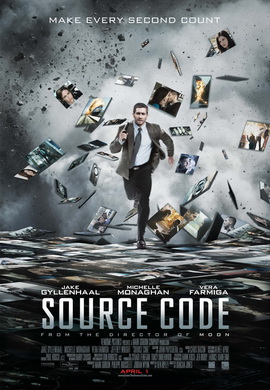
SOURCE CODE
Canada, 2011, 93 minutes, Colour.
Jake Gyllenhaal, Michelle Monaghan, Vera Farmiga, Jeffrey Wright, Michael Arden, Scott Bakula.
Directed by Duncan Jones.
Fans of intelligent thrillers will like this one.
When Captain Colter Stevens wakes on a train to Chicago and finds that his travelling companion calls him Sean and says he is a teacher, he is more than bewildered because he knows he has been serving as a helicopter pilot in Afghanistan. After some attempts at grappling with what is happening to him until there is a mighty explosion, he wakes again, this time in a special pod, discovering he is the subject of an experiment in brain control. He has been made to identify with a teacher on the train and go back into the train to discover what caused the explosion, where the bomb was situated and who triggered the device.
So, back he goes, again and again and again. Movie buffs know what the groundhog day repetition is like, everyone else the same on the same day while the protagonist retains what he has learnt from each preceding visit to the past.
While the framework of the plot is science-fiction, science-fantasy, the captain’s many attempts to find out what has gone on are like a detective story. He shows great ingenuity after a number of re-visits, especially since he has a window of eight minutes only each time. This time is based on how much the memory of a dying man retains (like an afterglow when a light has been turned off, so the inventor of this process claims). The procedure is called Source Code.
Jake Gyllenhaal does a good job of creating a puzzled man who rises to the occasion of the challenge (and experiencing the explosion a number of times). Michelle Monaghan is Christina who warms more and more each time she encounters Captain Stevens – especially as he uses his previous knowledge each time. Stevens’ contact on each return is Goodwin (Vera Farmiga), a by the book officer who is also a compassionate listener and concerned about Stevens’ mental and emotional health. The scientist behind the development of Source Code is played by Steven Wright.
Needless to say, the film builds up a serious amount of suspense, the audience wondering whether Stevens will find the bomb, identify the bomber and save the day. This involves encounters with a great number of passengers, many of them ordinary, if sometimes irritable, commuters. The action is tempered with some comic moments as well as some romantic moments.
The challenge of time travel films is the physics – and also the logic. Whatever happens at the end, there is a slight let down when you are wondering what really happened, whether it could have happened and how it could have happened. But, that’s the nature of the genre. So, it’s probably best to put relativity theory, other dimensions, parallel worlds to one side, and just get involved in the action and the psychological demands made on Stevens, his service in Afghanistan, his memories of what he did there. He also has a longing to be reconciled with his father.
The screenplay by Ben Ripley is quite ingenious. The film was directed by Duncan Jones whose first film ventured into something of the same themes though this time in a space travel situation, Moon. They say it is risky to go back to the same material for a second film, but Jones has been very successful with Source Code. (It is completely irrelevant, but many are pleased to know that Duncan Jones is the son of David Bowie.)
1. The title? Science-fiction? Mystery, time travel, psychological identification and travel?
2. The Source Code as a device, Rutledge and his invention, control, controlling Stevens? The ability to relive time, identify with other personalities, into their mind, gathering information?
3. The cast, the director?
4. The initial setting, Colter Stevens on the train, with Christina? The mirror? His identity? Identifying with the teacher? The train exploding? His trying to understand what was going on? In himself?
5. Stevens finding himself in the Cockpit, Captian Colleen Goodwin, telling him he was on mission, the search for the bomb, the threat to Chicago, in the Source Code, his moving into other lives?
6. Reliving the train sequence, going into Chicago, with Christina? The different scenarios, the different times? The reality of his being injured in Afghanistan? On life-support?
7. Finding the killer, the killer faking his own death, Christina’s death? Stevens and his getting the licence and information, communicating this? Several more attempts and different lives?
8. Stevens, the communication with his father, the relationship?
9. Christina, walking through Chicago?
10. The Source Code, Rutledge and control, Captian Goodwin and the issue of which was the real timeline?
11. The finale, Stevens in coma, the solution of the problem – and his being asked to do one more task?
Published in Movie Reviews
Published in
Movie Reviews
Tagged under
Saturday, 18 September 2021 20:01
Fast Five
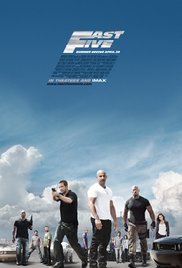
FAST FIVE/ THE FAST AND THE FURIOUS FIVE
US, 2011, 131 minutes, Colour.
Vin Diesel, Paul Walker, Jordana Brewster, Tyrese Gibson, Ludacris, Sung Kang, Gal Gadot, Joa quim de Almeida, Dwayne Johnson.
Directed by Justin Lim.
Another sequel and the series is certainly vrooming. (And, if you wait during the final credits you will find a short trailer/teaser for Fast Six.)
There are speeding cars doing manoeuvres round a bus on a desert highway with the bus overturning and rolling and rolling. There is a robbery of flash cars from a moving train, a carrier vehicle crashing into the train, Paul Walker hanging on to the edge of the carrier as a narrow bridge is approaching, then he and Vin Diesel and a car do a Butch and Sundance very long leap into a river only to be surrounded by thugs. And that’s only the first twenty minutes!
Fans of the series will know the characters, Vin Diesel’s occasionally smiling taciturn Dom, Paul Walker’s smiling Brian O’Connor?, Jordana Brewster’s romantic side as Dom’s sister and Brian’s wife. In the past, they were in Tokyo and this time they are in Rio. Plenty (plenty) of moving postcards shots of the city and its beauty – and plenty of warning not to go into the barrios unless you are Vin and Paul. Even the crack US agent, Dwayne Johnson doing a tough impersonation of his professional wrestling name, The Rock, and his team find that they have to backtrack in the face of the gangs and their guns.
Joaquin de Alameida is Reyes, the Rio kingpin of drugs and deals who has, it seems, most of the police in his pocket. (I wonder what Brazilian director, Jose Padilo, maker of the two Elite Squad films thinks, about it with his very dim view of the Brazilian law enforcement agents.) Dwayne is after Vin and Paul. Vin and Paul are out to get Reyes. We don’t waste much time in watching the planning. We generally go straight into action. And, there are some twists – nice one at the end.
If Al Jolson had been writing this review, he would at this stage say, ‘You ain’t seen nuthin’ yet’. The last twenty minutes are much more oomphy than the first twenty. How they filmed it, I don’t know, but it looks like a real chase with umpteen cars or more smashing their way through the streets of Rio.
The fans, despite the fact that there have been four fast and furious films already, will certainly not be disappointed. Nor will the producers because it seems there are more than enough fans out there to pay up – and ensure Fast Six.
1. The popularity of the series? Number five? Cars, races, speed, the furious?
2. The cast on their return, the central characters, the supporting team?
3. Action sequences, stunts, special effects? The score?
4. The opening, continuity, Dom in prison, on the bus, Brian and media, their relationship, chasing the bus, getting Dom out of the prison? Their continued chases, breaking barriers, the law, borders, speed? Arriving in Rio?
5. Rio, Brazil, the scenic aspects, the streets, poverty, gangsters?
6. The pressure on the team, in Rio, the decision to rob the gangster chief? Assembling all the team, the variety of characters? Personalities?
7. Brazil, the gangster, wealth, corrupt, the team targeting him?
8. Luke Hobbs, his reputation, tracking people, finding people? Going to Rio, the encounter with the group, the chases and pursuits, the final confrontation?
9. The film’s emphasis on action and thrills rather than the characterisation? Building up to the final confrontation and spectacle? The sequel?
Published in Movie Reviews
Published in
Movie Reviews
Tagged under
Saturday, 18 September 2021 20:01
Hoodwinked Too: The Battle between Hood and Evil
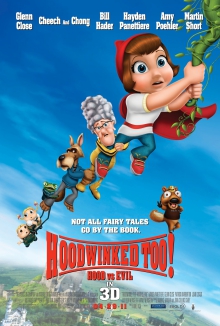
HOODWINKED TOO! THE BATTLE BETWEEN HOOD AND EVIL
US, 2011, 86 minutes, Colour.
Voices: Hayden Panettierre, Glenn Close, David Ogden Stiers, Patrick Warburton, Bill Hader, Amy Poehler, Cheech Marin, Tommy Chong, Martin Short, Joan Cusack, Brad Garrett.
Directed by Mike Disa.
Like the original, this is a hit and miss affair – and many will not be sorry if they miss it.
The idea in the original was to update some fairy tale characters and involve them in a puzzle which they had to solve by brains (well, not all of the characters are blessed in this particular area) or by brawn, with some magic thrown in. Working on the Red Riding Hood Story in Hoodwinked, Red became a heroine with some mean martial arts moves. Granny was a wise old woman who, in the parlance, was not averse to kicking ass.
The setting is a strange mixture of the past and the present, much of the latter part of this sequel taking place downtown in a modern city, streets and skyscrapers.
The screenplay is not particularly witty. The play on words in the sub-title is probably the best joke. The plot is basic, though there is a twist when (spoiler!), the twee little Hansel and Gretel, imprisoned in the gingerbread house by the wicked witch, Verushka, are the target for rescue by Red, Granny and the dumb Big Bad Wolf, under the guidance of Nicky Flippers, a frog in command of a special fairyland rescue squad. Then Hansel and Gretel turn into a neo-Nazi twosome bent on fascist rule and demolition with heavy Cherman accents and all.
The voice cast has many stars who give it their best, especially Glenn Close (as before) as the feisty Granny. Joan Cusack is effective as Verushka. Patrick Warburton is again the Wolf and David Ogden Stiers is Nicky Flippers. There is some amusement from Martin Short’s flamboyant, yodelling Kirk. Hayden Panettierre is functional as Red.
Maybe the kids will respond to some of the action, parents probably not.
Published in Movie Reviews
Published in
Movie Reviews
Tagged under
Saturday, 18 September 2021 20:01
5 Days in August
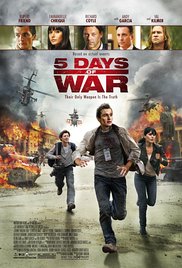
5 DAYS IN AUGUST/ 5 DAYS OF WAR
US/ Georgia, 2011, 113 minutes, Colour.
Rupert Friend, Emmanuelle Chriqui, Richard Coyle, Heather Graham, Jonathon Schaech, Rade Serbedzija, Andy Garcia, Val Kilmer, Kenneth Cranham, Dean Cain.
Directed by Renny Harlin.
Which five days of war, in which August? The answer is early August, 2008, when Russia and Georgia were involved in a short war over the region of Southern Ossetia and whether it belonged to Russia or to Georgia. The Russians invaded – and are still in occupation.
The treatment of war is much the same as in many similar films. The interest is in being offered a glimpse of the war, the people, the suffering, the political issues, the response of the Russian leadership of Medvedev and Putin, the decisions of the Georgian leadership. While there are scenes of battle, the focus, in fact, is on foreign journalists and their role in bringing images of atrocities to the world’s attention (even when the networks show no interest and are concentrating on the opening of the Beijing Olympics).
There is no doubt that the film is on the side of Georgia. The Russians are presented as barbaric invaders. Some commentators have felt that the film is propaganda. Others argue that it is not propaganda even though it firmly presents the views of Georgia. There is an underlying desire in the screenplay, despite the war and cruelty, for peace and freedom. And the film opens with the quotation about the first casualty of war being truth. There is also a statistic that in the past decade over 5000 journalists have been killed in war situations.
The film opens in Iraq 2007 where casual chat on the way to an interview is prelude to a deadly ambush. The central character, journalist Tom Anders (Rupert Friend) and his cameraman Sebastian Ganz (Richard Coyle) go to Georgia at the invitation of their journalist friend, Dutchman (Val Kilmer). As the war breaks out and there are uncertainties, they go up country and film a local wedding which, we know, is going to be bombed. What follows is a rescue of the bride, her sister who has been educated in the US, and their South Ossetian father. They are helped, and later rescued, by a Georgian fighter (Jonathan Schaech), but they also have to hide and witness atrocities carried out by a Cossack soldier. They are captured and interrogated to find the memory card with the incriminating footage, especially by a Russian commander (Rade Serbedzija) whose son was killed in Afghanistan and who has a world-weary view of war.
In the meantime, the president (Andy Garcia) and his cabinet are appealing for US help, not forthcoming, and for help from the European Union (eventually).
To a large extent, the material is familiar, characters and situations from other war films: the bawdy journalistic chat and drinking, the heroic rescues, the split second rescues, the rounding up of the innocent, the long marches of people displaced.
Director, Renny Harlin, is better known as a director of action films like Cliffhanger and The Long Kiss Goodnight.
Despite these limitations and the fact that the hero is not particularly likeable, we become involved in the crises, perhaps remembering this war vaguely, how it impinged (or did not) on our consciousness, and being reminded of so many similar (and worse) wars in our time.
1. Topical drama? Especially at the time? The discussion about whether the film was propaganda or not?
2. A reflection of conflicts in the, especially with Putin Russia? The situation of Georgia? The title, the focus on the war and the attack? Media response – and the irony of the world concerned about the Beijing Olympics at the time?
3. Russia, Georgia, Ossetia?
4. The opening in Iraq, the setting of the 21st century war and occupation, the mentality? The reporter, her death? The locations, ambush?
5. Georgia, Tblisi, the countryside? The Russian forces, the local forces? The attacks, bombardments, people, migrants?
6. The wedding sequence, bombardment, the rescue?
7. The focus on the journalists, their work, the difficult situations, embedded? Journalists rights?
8. Tom Anders, Sebastien Ganz, journalist and photographer? The contact with the Dutchman? His influence? The transfer?
9. The two travelling the country, the wedding, the bride, the system, the father, the attack, the escape?
10. The local fighter, his encountering the journalists in Iraq?
11. The Cossacks, atrocities?
12. Capture of the journalists, the interrogation, the commander, his son’s story, his weariness with war?
13. Georgia, the president, the meetings, the politicians, wanting help from the United States, from the European Union?
14. The work of the director, his tradition of action films, conventions of fighting, battles, escapes? Rescues? Innocent victims, displaced
people?
15. A film of action, yet significant at its time for the issues?
16. The final testimonials?
Published in Movie Reviews
Published in
Movie Reviews
Tagged under
Saturday, 18 September 2021 20:01
Man Who Knew Infinity, The
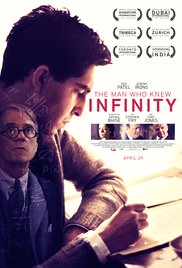
THE MAN WHO KNEW INFINITY
UK, 2016, 108 minutes, Colour.
Dev Patel, Jeremy Irons, Toby Jones, Jeremy Northam, Kevin Mc Nally, Devika Bhise, Anthony Calf, Stephen Fry, Richard Johnson.
Directed by Matt Brown.
Dev Patel made a strong impression as a young man in the Oscar winning Slumdog Millionaire in 2008. He has grown older since then and is able to give a fine performance in an adult role, a man from the Madras in 1914 who has a talent for mathematics.
The film is based on actual events and characters, focusing on S. Ramanujan.
The film opens with a tribute to him spoken by Cambridge mathematician, G. H. Hardy, played with his customary seriousness by Jeremy Irons. The film moves in flashback to Madras, to Indian life in the city, a young married man, rather dominated by his mother, looking for a job and finding a sympathetic manager who introduces him to keeping accounts for British Sir Francis (Stephen Fry). But, the young man has notebooks full of mathematical equations – is not able to explain how he came to them. He relies on intuitions or, as he would interpret them, visions and enlightenment from the deity. He has an ambition to go to Cambridge, to meet Hardy and work with him, to publish his material – but caste customs indicate that he cannot travel abroad from India. However, with support from his wife but apprehensiveness from his mother, he sets out and goes to Cambridge.
He meets with Hardy and his associate John Littlewood (Toby Jones). He is exhilarated to be there. They are amazed, almost overwhelmed, by the amount of material in his two books of formulas. However, he is not entirely welcomed as an Indian in this academic world, especially when World War I breaks out and young British soldiers resent him as they go to war – and bash and kick him.
While many audiences will not be privy to the secrets and beauty of mathematics, they will still enjoyed this picture of a young genius, his earnestness, his willingness to collaborate, his eagerness to publish, the challenge by his mentor to provide rational proofs rather than claim intuition, not something he can easily do (and puzzles why this is necessary). It is always not always easy working with Hardy, a reclusive man whose sole world and life is mathematics but who has to learn, even a little, what it is to be human and to have some sympathy for others.
The study of the natural world is physics. Philosophers tell us that we can mentally abstract from the physical world to a plane of mathematics with its own order and beauty, open to Infinity. Beyond that is metaphysics. There is one moment for the uninitiated when 4 is explained: 1+1+1+1, 1+1+2, 1+3, 2+2, 4 – the several realities of a number which gives them a more complex life.
Ramanujan at one stage goes to a maths class, has an intuition which he writes on the board, only to be rebuked arrogantly and with racist tones by the professor who will later oppose Hardy’s nomination for Ramanujan to be a fellow of the College.
In the meantime, his wife is lonely for him in India, his mother proud of his publication but not forwarding her daughter-in-law’s letters which further isolates both husband and wife.
Ultimately, he will return to India after the end of the war, but suffering from tuberculosis.
At one stage, Hardy shows Ramanujan various manuscripts, including some from Isaac Newton, in the Wren Library in Cambridge – and, the audience will feel an emotional sympathy at the end, viewing one of Ramanujan’s manuscripts preserved in a glass case there.
In many ways the film is uplifting, and despite the mathematical themes, feelgood.
1. The title, indication of philosophical reflection, mathematics, academia? Audience interest?
2. The film based on actual events, the tribute to Ramanujan?
3. Audience knowledge of him? Of mathematics?
4. The locations, India, Madras, the city, homes, poverty, workplaces? The contrast with the United Kingdom, Cambridge University? The atmosphere of World War I, the college quadrangle and the tents, medical care for the wounded? The musical score?
5. Ramanujan’s mother, issues of caste, his not being permitted to travel, his menial job, his wife and her love, the manager admiring his mathematics, getting a job, the interview with Sir Francis and his initial reaction, his writing the letter of support? Wanting to go to England, his mother’s reaction, upset, his wife accepting that he should go, the wharf, on the boat?
6. The opening, with Hardy, his indebtedness to Ramanujan? The discussions about mathematics, its beauty, the visuals of the pages of formulae and equations, the categories of mathematical exploration like Partitions? The explanation of the number 4 and the many
combinations to make 4?
7. Ramanujan arriving in Oxford, the encounter with Littlewood, not allowed to walk on the grass, only for the fellows? The introduction to Hardy? Hardy and his previous reaction to getting the letters, thinking that Littlewood was taunting him? The meeting, the volumes, the amazement of the Cambridge dons?
8. An Indian in Cambridge in 1914, the dining room, the fellow Indian student, the problems with food, vegetarian, his buying vegetables in the market, cooking in his own room? The later consequences of the poor food during the war, the rations? Contributing to his illness? An Indian and the experience of superiority of the British, empire, the war and the young military men bashing and kicking?
9. Hardy and Littlewood, the admiration for his work, the two volumes, the working together?
10. Hardy, his personality, rational, wanting proofs? His love for mathematics? Hard personality, dedicated? His continued smoking, the encounters with Ramanujan, his admiration of the equations but his wanting the proofs?
11. Sending Ramanujan to the class, the equation and his demonstration, the lecturer and his arrogance and racism? His later opposing Ramanujan as a fellow?
12. The tensions, the background of World War I, Hardy and his attitude towards the war, Littlewood and his being seconded, expert on ballistics? The transformation of the quad, the tents, the nurses, wounded, the doctors? Ramanujan and his illness, going to the doctor, collapse, tuberculosis, the bad food, the cold?
13. Partitions, the challenge, Hardy and his continued wanting proofs, Ramanujan wanting to be published, having intuitions, not needing proofs? His delight in the publication of the article? Going to visit Mc Mahon, defying and challenging him, Ramanujan demonstrating his ability, the rivalry? His formulating the proofs, proving Partitions, Mc Mahon conceding that he had succeeded, beingn persuaded to support Ramanujan as a fellow?
14. Bertrand Russell, his reputation, role as a philosopher, friendship with Hardy and Littlewood, the academic jealousy, his stances on the war, his being ousted from Cambridge, going to Oxford?
15. The years passing, Hardy and his work, his severity with Ramanujan, Ramanujan being hurt? Hardy nominating, the opposition, letting him know that the application had failed? More proofs, presenting these to the fellows, Hardy and his speech, his going outside, the good news, Ramanujan coming to the room, the academics knocking the table in acclamation?
16. In India, his wife missing him, writing the letters, her being sad not receiving any, his not receiving her letters, the mother hiding them in the draw, her pride when he was published, the final letters, his wife going to the letter writer, finding the draw, the mother and the motivations, his return?
17. His return to India, reunited with his wife, his continued work, the achievement of four years, the experience, publication, proofs? His death?
18. Hardy, the Wren Library, the statues, the manuscripts, the tree in the quad where Isaac Newton experienced gravity?
19. Ramanujan, his manuscripts, the 1976 discovery, the close-up of the manuscript in the library?
20. Hardy and Littlewood continuing years of work together, Ramanujan’s influence, achievement?
21. The film as a fine tribute, admiration for Ramanujan as a genius?
Published in Movie Reviews
Published in
Movie Reviews
Tagged under
Saturday, 18 September 2021 20:01
Marguerite
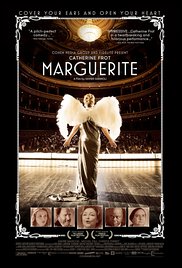
MARGUERITE
France, 2016, 129 minutes, Colour.
Catherine Frot, Andre Marcon, Michel Fau, Christa Theret, Denis Mpunga, Sylvain Dieuaide, Theo Cholbi, Sophia Leboutte.
Directed by Xavier Giannoli.
The opening of this film says that it is based on a true story. In fact, it is a French variation and interpretation of the singing career of the American Florence Foster Jenkins (subject of her own film in Stephen Frears film of the same name, Meryl Streep appearing as the singer). Her story has been transferred to France, to the 1920s, and some imaginative interpretation about Marguerite’s delusions about her singing.
Audiences will enjoy the 1920s settings very much, elaborate costumes and award-winning decor, the picture of wealthy French society, the mores of the time.
However, it is Marguerite and her singing that audiences have come to see and hear. In the opening society concert, we are treated to beautiful renditions of the duet from Lakme and other singing performances. In the meantime, Marguerite is dressing, preparing, with her peacock feather (there are peacocks in her husband’s estate and their raucous cry mimics the sounds that Marguerite will utter). She is introduced, welcomed with applause, and then the audience, and we the audience, have never heard Mozart’s song of the Queen of the Night from The Magic Flute rendered in such a loud and confidently off-key manner. Marguerite screeches. And later she will sing the Marseilleise as well as La Habenera from Carmen with the same extraordinary rendition.
Marguerite is deluded but no one has the confidence or courage to let her know, not even her husband who is urged to do this by his mistress, almost does it, but fails. The extensive staff of the mansion applaud their mistress – and she is supported by the Butler of the house, who serves as something as her protector and guard, Mandelbos, who takes a number of photos of her, groups, Marguerite dressed in opera costumes, drives a car, arranges the floral tributes, wards of unwelcome guests.
The trouble is that her performance goes well, according to Marguerite, and she gets the idea that she should give a public recital. She cannot be persuaded otherwise. She is encouraged by a young man, a newspaper writer who is in love with the genuine young singer whom Marguerite had encouraged. He takes her to a performance of Pagliacci, quite a powerfully rendered, which delights Marguerite and the suggestion is that the singer, actually down on his luck and a frequenter of a gay bar, should be her teacher.
Marguerite undergoes extensive training, breathing exercises, movement, loosening up, all the while singing off key, her teacher shuddering, but forced to continue with his work by Mandelbos’s hold over him because of his relationship with his young assistant, and with a medium, a bearded lady in tow.
What will happen at the recital? While this is the climax of the film, the narrative goes on after the event, Marguerite’s illness, her friends recording her voice and intending to play it so that she can really hear how she sounds. And that is the climax that the film audience will have to wait for.
Catherine Frot is completely persuasive as Marguerite, full of life, enjoying life, longing for the love of her husband, wealthy and able to offer others patronage, yet absolutely tone deaf while music is her lifelong passion, and believing that she has the qualities of a star.
And the question, with the pathos behind it: can no one tell her the truth?
1. The title, the focus on Marguerite, her singing?
2. Or based on the story of Florence Foster Jenkins, comparisons with the film of Florence, this film and extended imagination?
3. The 1920s, costumes and decor, the mansion, interiors and exteriors, the baroque rooms, the grounds? The countryside, roads, the city and streets? Cars? Opera, the gay club, the hospital? Atmosphere?
4. The music, the singing, the arias from Lakme, Pagliacci, the orchestra and chorale?
5. The rendition, off-key, of the Queen of the Night from the Magic Flute, La Marseilleise, La Habanera from Carmen, the Marriage of Figaro, the rehearsal material – and the final performance? The peacocks, her feather, the sound of the peacock echoing Marguerite?
6. The character of Marguerite, age, marriage, her husband and his mistress, no children, her wanting to please him, genteel and aristocratic? Her reliance on Mandelbos? The rest of the staff? Society, friends? Her ambition, unreal, noone telling her the truth or breaking her delusions?
7. The opening concert, Hazel and the young singer, her performance, appreciated, taken to meet Marguerite? Kyril and his mockery? Lucien, ambivalent, his love for Hazel, work for the paper, fawning on Marguerite, financial support?
8. The members of society, the organisation for singing, the wealthy, the introduction to Marguerite, dressing and getting ready, her singing and the reaction? The cinema audience reaction? Everybody praising her, the elaborate photos, the reviews, her being protected from the truth by her husband – and his later failure while he tried to tell her the truth?
9. Her husband, his deliberately being late, stories, the photos of her on his desk, his mistress, her supporting marguerite and wanting her to know the truth, his attempts, Marguerite finding the scarf, seeing it on his mistress, a blow to her and her pride?
10. The idea of a recital, Lucien and his supporting this? The visit to the opera, Pagliacci, her enthusiasm, meeting the singer?
11. The visit to the singer, his presence in singing the role, disputes about the applause, the interview, the proposition that he coach Marguerite, the effect of the interview, the visit to the gay club, the boy, the bearded lady, the tarot cards? His going to the house, hearing Marguerite sing, his reaction? Wanting out?
12. Mandelbos, his omnipresence, his role with Marguerite, serving her, the photo collection, the flowers – and all the flattery with flowers – driving, his devotion, his aim in finishing the album? His blackmailing the opera singer, the compromising photos?
13. Lucien, fickle, love for Hazel, wanting to go to write his novel?
14. The scenes of the rehearsal, the detail, the singer and his crew, the boyfriend and his concern about money, the food, Mandelbos and the relationship with the bearded lady? The singer almost telling Marguerite the truth but unable to?
15. Marguerite and the discovery of the scarf, the hurt when she saw the mistress wearing it? Her husband’s excuses?
16. The visit to the doctor, her throat?
17. The buildup to the performance, in the dressing room, introduced, the angel’s wings, singing, the whole audience collapsing and laughter, the embarrassment for Hazel and Lucien, for her husband?
18. The collapse, the blood, in hospital, the doctor and the treatment? Her being cheery, the recording of her voice?
19. The buildup to the playing of the record, hoping that she would realise the truth? The husband wanting to call it off? Mandelbos, wanting the final photo, his letting it go ahead? The car actually breaking down? Marguerite on the platform, Lucien and Hazel and those
present? Her reaction to hearing her voice, her collapse, her death?
20. Mandelbos and the final photo for the end of the film?
Published in Movie Reviews
Published in
Movie Reviews
Tagged under
Saturday, 18 September 2021 20:01
Night Manager, The
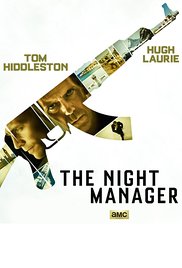
THE NIGHT MANAGER
UK, 2015, 330 minutes, Colour.
Tom Hiddleston, Hugh Laurie, Olivia Colman, Elizabeth Debicki, Michael Nardone, Alistair Petrie, Douglas Hodge, David Harewood, Tobias Menzies, Adeel Akhtar, Neil Morrisey, Jonathan Aris, Natasha Little, Katherine Kelly, Simona Brown, Aure Atika.
Directed by Suzanne Bier.
John le Carre’s novels have been popular for over 50 years, from such film versions as The Spy who came in from the Cold and the Looking Glass War in the 1960s, to the television series of the stories of Smiley, to the film version of Tinker, Taylor, Soldier, Spy in the 21st century and A Most Wanted Man.
This present film, screened as a series on BBC, is a topical story of the 21st century, the focus on international arms dealers, military entrepreneurs, their customers all over the world but especially from the Middle East, the covers as humanitarians, the ruthlessness of their lifestyle as well as its luxury.
The title refers to Jonathan Pine, played effectively by Tom Hiddleston, a man with a war background in Iraq, working as a night manager in a Cairo hotel during the uprising in 2011, getting information about deals and sending it to London. He is recruited by Angela Burr, a fine role for Olivia Colman, who has been pursuing a British arms dealer, Roper, one of the best roles for Hugh Laurie, a supremely smug and self-confident evil man. Pine ingratiates himself into Roper’s world and becomes his trusted associate, meanwhile continuing to send information to London. And, of course, there are traitors in the government offices.
The film looks very good with locations in Egypt, Switzerland, Mallorca, Turkey and the desert.
The film was directed by the Danish director, Oscar-winner Suzanne Bier, quite a different enterprise for her but very effective. And there is a fine cast of supporting actors. As might be expected, there is a romantic subplot involving Roper’s wife played by Australian actress, Elizabeth Debicki.
The film is strong in characterisation, plot, twists of fate as well as a look at 21st century espionage and spies who might have been in the cold but go back into action.
1. The long popularity of novels by John le Carre, the wide audiences over the decades, this 21st century and topical story?
2. The title, the focus on Jonathan Pine, his military background, working in hotels, his relationships, his anger, coming across information and submitting it, recruitment by the foreign office, the consequences?
3. The variety of locations, scenery, landmarks, touches of the exotic: Cairo in 2011, England and the Devon coast, Switzerland and the mountains in the snow, the variety of hotels, Mallorca and its idyllic scenery, Turkey and hotels, the docks, the desert, the military base, London and Whitehall and the foreign office, the political world? The musical score?
4. The strengths of the cast? The director?
5. The screenplay, plot, use of language, sense of mystery, dramatic twists?
6. The topicality of the plot? International arms deals, the double lives of the entrepreneurs, their political connections, ruthlessness, living in luxury, in the mountains, at the sea, the range of hotels and staff, tough environment, the amounts of money changed, loyalties and betrayals, wives and children, wars and massacres, deals, international customers, investigations?
7. The portrait of Jonathan, initially seen in Cairo, his army background, his duties at the hotel, available for people, allowing himself to be imposed on, the attraction of the girl, helping her, the sexual relationship, love, giving the information? His friend at the embassy, sending the information, her death, Jonathan’s anger towards Freddy? Transferring to Switzerland, continuing in the same work? The visit from Angela, discussions, the recruitment, his commitment? Going to England, the new identity, getting the documents? Devon, the girl, attraction, the drug-dealer, Jonathan’s ruthlessness, pressure on him, murder? The building up of his file? In Mallorca, working at the hotel, the abduction of Roper’s son, the rescue, the setup and the violence? Ingratiating himself with Roper, his recovery? The meeting with Jed and the attraction? Sandy and his wife? Corky and his suspicions? The bodyguards and thugs? Becoming part of Roper’s entourage, trusted? Taking the boy out – and his ingenious way of communicating, the episode of buying the ice cream? Contacts and further information? Roper, the invitation, trusting him and making him a partner? Corky and the insinuations against him? The base, going outside the base to communicate with Angela, discovered by Corky, the fight, his death and Roper burying him? His becoming Andrew Birch, the money, scanning of his eyes, exercise, central bank accounts, his studying weapons? Meeting the trust and playing his part? Turkey, unloading the weapons, the trucks, information to London? Going to the base, the experience of the extent of the base, the demonstrations of the weapons? The false information and Roper and his surveillance? The trucks with farm goods? Cairo, Angela and Joel coming, the casino, Freddie and the drugs, drowning him in his pool? Telling the truth to Jed, her getting the pass from the safe, Roper discovering the truth, saving face and Jonathan’s presence at the further meetings? The issue of the transfer of the money, its disappearance? Exploding all the vehicles? The arrests, Angela and Jed, a future?
8. Roper, seeing him on television, humanitarian and saving children? His arms deals, his entourage, Jed and Daniel, the thugs? Trusting Corky, Sandy? In Switzerland, impressed by Jonathan, in Spain, the abduction of Daniel, his interest in Jonathan, liking him, the recuperation, inviting him closer, advice? The death of the Spanish lawyer? Seen as the traitor? Turning Jonathan into Andrew Birch, giving him power? The associates, Turkey, the arms on the wharf, the meetings with the dealers, tensions, agreements, Roper and his pressure? Sandy and his role in the deals? Going to the base, the amount of equipment, the demonstration of arms, the bombing of the village? His relying on Corky, Corky and his friends, ousting them from the Villa? The false information about the trucks, going back to Cairo, safety, the further deals, at the camp, Sandy and the transfer of the money? Discovering Jed had gone to the safe, battering her, her being tortured? The final sales, Jonathan keeping face, the explosions, the arrest, his vanity and being sure of his safety? Into the van, the dealers and their thugs, getting their revenge?
9. Angela, her career, her past, in the Middle East, the shock of destruction, by arms, her pursuit of Roper over the years? Those working for her, in the office, their reliability? The discussions with Rex, his help? Going to Switzerland, her recruiting Jonathan? Setting him up? The information sent by him, information about the politicians and their money deals, the aliases? Her expertise, Jonathan contacting her, the Parliamentary Secretary and taking control of the operation, jealousies? Her being followed, the threats at the door? Her pregnancy, relationship with her husband, his being attacked? The false information the Syrian border? Her relationship with Joel, his coming to England, the collaboration? His return to America? Going to Cairo, putting the document back, the risk, the bodyguards and the search, Joel ringing about the parcel, taking the gun, Jed being brought to the room, shooting the bodyguards leg, success? The range of people whom she worked with – final call to Dromgoole and his not answering Roper’s phone call? Angela and her assistant, the Permanent Secretary?
10. Freddie and his treatment of his girlfriend, death, motivation? The girl and her relationship with Jonathan? Sandy and his wife, his mistress, the pressure of his wife after leaving, being brought back to spy on Jed and the risk of losing her children?
11. Jed, the dubious background, having the son? With Roper, love or not, the comfortable life? His love forher? With Daniel? Life and style, not knowing what Roper did? The attraction to Jonathan, being careful? The change, photographing the documents, explaining to Roper, his taking her on the trips, to the base? With Jonathan, the sexual encounter? In Cairo, the casino, learning the truth, taking the document from the safe, trying to return it, the code changed? Torture, and Angela rescuing her? With Jonathan and the possibility of seeing her son again?
12. Corky, trained, Roper loyalties, extravagantly gay, his advances, attraction to Jonathan, wary of him, jealousies, the insinuations? Jonathan besting him? His return, finding Jonathan at the fence, struggle, death, Roper burying him? Roper’s later regret?
13. Roper, the thugs, the bodyguards, killing and torturing?
14. Spanish lawyer, Angela getting to him, the visits to the church, the deaths, his turning, giving her the information, the brutality of his murder?
15. The British, the politicians, the codenames, the deals, the profits, protecting themselves? The variety of meetings for security? The Permanent Secretary, the threats to Angela?
16. Rex, a good man, the pressures, his decisions, supporting Angela – and the blackmail of his promotion?
17. The dealers, in the Middle East, the vast amount of weapons, the visits and discussions, the demonstrations, the money, the transfers online? The explosions – and their being thwarted, their revenge on Roper?
18. The overall effect of this Le Carre story four television, the running time, the complexities of the story, characters, topical impact?
Published in Movie Reviews
Published in
Movie Reviews
Tagged under
Saturday, 18 September 2021 20:01
Jucy
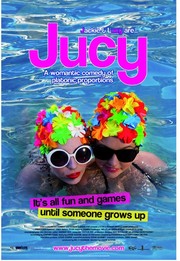
JUCY
Australia, 2011, 90 minutes, Colour.
Cindy Nelson, Francesca Gasteen.
Directed by Louise Alston.
A Brisbane comedy which will resonate there – and, hopefully, all round Australia.
The title? A combination of the names of the two leads, Jackie and Lucy. This film owes a great deal to the combination of talent seen with, say, Dawn French and Jennifer Saunders. Jackie (Cindy Nelson) is the larger than life comedian. Lucy (Francesca Gasteen) is the slighter but more sardonic comedian. They are both 20-somethings who have not entirely grown up.
They have done everything together for years – a kind of co-dependence and friends wonder about their ‘womance’, the female version of ‘bromance’. They work in a video store for customers with ‘alternative’ interests and tastes and give their advice to the eccentrics who are looking for their favourite or new ‘genre movies’. They socialise but turn events into messes for themselves and others. It is the same with relationships.
When they branch out, especially with a local production of Jane Eyre, where an oddball company have rehearsals (with Jackie and Lucy vying for parts and attention, especially for the role of Jane rather than the mad wife), where they tangle with the director and the leading man, where there are complications with the printing and distribution of the posters. Jealousy rears quite an ugly head.
So Jackie and Lucy have to experience alienation before they can accept themselves and each other – which, of course, they do.
The film was co-written and directed by Louise Alston who made another local comedy, All My Friends are Leaving Brisbane (2007).
Jucy’s initial release outside Brisbane is in local country areas rather than in the capital cities. (Parochial distribution? Or apprehension about interstate rivalries and criticisms?)
1. Local film? The Brisbane audiences? Australians? Wider?
2. Brisbane settings, landmarks, ordinary life, homes, store, theatre? Musical score?
3. A buddy movie – of two women? The title and the combination of their names? A “womance”?
4. The characters of Jackie and Lucy, the growing up together, their friendship, the influence of their early life?
5. Jackie, age, insecurity, anxiety, awkward in society, difficulty with relationships?
6. Comparisons with Lucy, her age, insecurities, not finishing her two degrees, living at home with her mother?
7. The two, the nature of their friendship, working together, at work, the video store, alternative, their interaction with the range of clients – and their eccentricities?
8. The two women on their response to observations, to criticisms?
9. The production of Jane Eyre, both being involved? Both wanting the central part?
10. Rehearsals, their interactions with people, the leading man and the attraction? Jackie and the actor? Lucy the possibilities for a career?
11. The testing of their friendship, whether they will have to break, whether they will have to go out on their own…?
Published in Movie Reviews
Published in
Movie Reviews
Tagged under
Saturday, 18 September 2021 20:01
Big Mamma's Boy
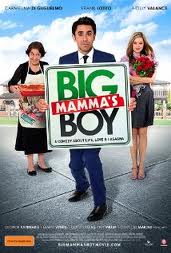
BIG MAMMA’S BOY
Australia, 2011, 90 minutes, Colour.
Frank Lotito, Holly Valance, Carmelina di Guglielmo, Steve Mouzakis, George Kapiniaris, Maria Venuti.
Directed by Franco de Chiera.
Not to be confused with the Martin Lawrence comedies where he is a detective disguised as Big Momma for his investigations. This one has an Australian spelling for Mamma and is distinctly Australian – or, at least, Italian- Australian.
If you were to put your mind to writing an outline for a screenplay about a middle-aged man still living with his doting Italian mother, with a grandfather in the background, who works in real estate and seems to be good at it, who sings (well) at a club and who encounters a co-worker with whom he falls in love but Mamma cannot accept because she is not Italian and who engineers a girl to come out from the homeland..., then you would probably come up with most of what is in the film. You might be a bit more restrained on the sex angle and relationships though agreeing with the female characters who find the macho office types more than irksome. You would probably have all the food elements. You might not have thought to have some Greek characters as well, especially the boss of the agency. But, the writer and star of the film, Frank Lotito, has – and they are all here. Which puts this in the tradition of Wogboy, Take Away and the Kings of Mykonos, although they were a bit better.
This means that Big Mamma’s Boy has its humorous moments, its stereotypical moments, its crass moments and, ultimately, its heart in the right place. It is not demanding in any way.
Frank Lotito does not create a consistent character, bashful one moment, brashful the next, under Mamma’s thumb one moment, then defying her, in love with Katie one moment and ready to two-time her the next. Maybe, Lotito is actually saying Italian-Australian? men are like this. Hard to know. Carmelina de Guglielmo fulfils all the expectations for Mamma. But, Holly Valance is attractive as Katie and, though she does her best, I was not persuaded that she really loved our hero and could spend the rest of her life with him after their move from Eaglemont to Ivanhoe – a Melbourne story.
Published in Movie Reviews
Published in
Movie Reviews
Tagged under
Saturday, 18 September 2021 20:01
Big Momma's: Like Father, Like Son
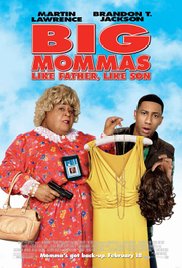
BIG MOMMAS, LIKE FATHER LIKE SON
US, 2011, 107 minutes, Colour.
Martin Lawrence, Brandon T. Jackson, Jessica Lucas, Tony Curran, Ken Jeong.
Directed by John Whitesell.
There were obviously enough fans out there, especially in the US, for Martin Lawrence to don fat suit, wig and mammy dresses to do undercover work in Big Momma’s House 2. There must have been enough again for this Big Momma Three. However, Malcolm, the FBI agent, has now acquired a stepson whom he wants to study at Duke University, whereas the son, aged 17 (a year older than Justin Bieber when he launched his career) already has his music contract to be signed by Malcolm for his first CD.
You think - how can they both get into the fat suits and the wigs (and the son’s appalling sense of fashion) so that the film combines parental clashes, FBI investigation, comedy of mistaken identity and the possibility of a school romance? Step by step they do, making it seem almost plausible at times. The quick answer is that a USB stick the FBI needs for evidence has been hidden in a music box in a girls’ art school in Atlanta. Malcolm’s opportunity for an arrest has gone wrong and his son has witnessed a murder. So, a variation on St Trinians, with Malcolm becoming Big Momma the house mother and the son becoming Big Momma’s grandniece.
It all plays out much as we might expect but that’s the nature of this kind of comic action concoction. The gangsters, Eastern European, of course, are really nasty. However, this is meant to be a cheerful movie so, during the final credits everyone in the cast, gangsters included, have the chance to join in the rap song and move with the rhythms. No real reason why Big Mother couldn’t come back again.
1. The popularity of the series? The comedy for African- American audiences? Wider audiences? The popularity of Martin Lawrence?
2. The American cities, homes, police precincts, the all-girls school? The musical score? The final rap song?
3. The title, father and son, the bond between the two, both in disguise? Comic sequences?
4. Malcolm, his past career, his relationship with Sherry, Sherry absent? His character, detective work? In police action? The relationship with his son? Trent wanting to be a rap singer, not go to university? Wanting his father to sign the document?
5. Trent, age, character, underage, the University, his father’s signature? His interest in rap music? The contracts, the gangsters, his witnessing the murder? His father’s help?
6. Comedy of men in women’s disguise? The fat suits? Large African- American women? Grandmothers? The younger generation? Movement, voices, awkwardness and comic routines?
7. Trent, the encounter with Haley? The container with the USB stick? The gangsters wanting it? Murdering the informer? His getting the information that the USB was in another container? The gangsters and their search for the USB stick?
8. Trent, getting the help of his father? Going to the all-girls school, the house mistress? Life in the house, the girls – and the comedy of girls’ dormitories – and male presence? Malcolm and his shenanigans? Trent and his behaviour, as Charmaine?
9. The school, Trent and the attraction to Haley, in disguise, her not recognising him? The plans for the duet? The failure of the song, Trent exposed, Haley’s reaction?
10. The janitor, his attraction to Malcolm, his involvement with the USB stick – but his saving the day at the end?
11. The comedy with the mailman?
12. Haley, acknowledging that she had taken the stick, a prank?
13. Malcolm, going back to normal? Trent, deciding to go to the University, with Haley, his music?
Published in Movie Reviews
Published in
Movie Reviews
Tagged under